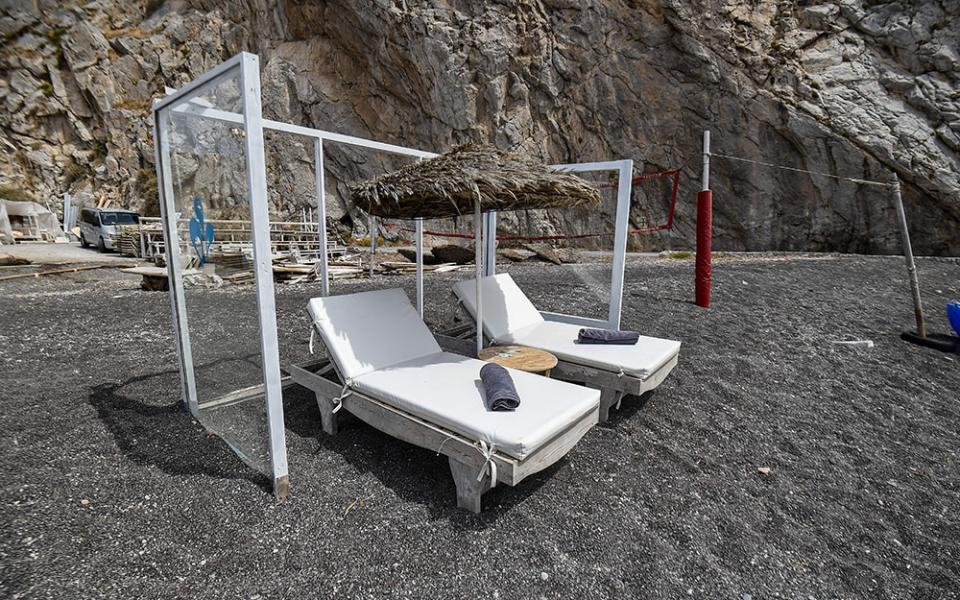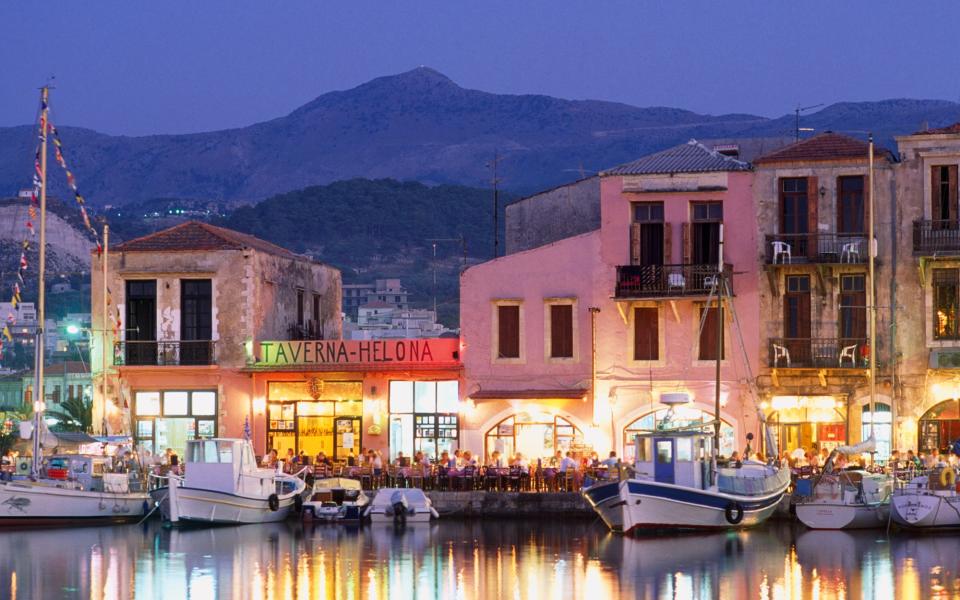Greece is welcoming tourists – here's everything you need to know about a potential summer holiday

With just under 3,000 cases of Covid-19 and relatively few deaths compared to other European countries, Greece is currently perceived as one of the world’s safest destinations for a summer holiday – and the country, which owes around 20 per cent of its GDP to tourism, is understandably eager to open for business.
“Our government took very swift action and it is showing results,” says Markos Chaidemenos, whose company, the luxury Santorini hotel chain Canaves Oia Resorts, plans to open all of its properties on July 1. But dreams of lounging on a sun-kissed Greek beach seemed likely to be out of reach for UK holidaymakers until last week when, in a surprise move, the Greek government reversed a decision to refuse entry to countries that were considered to be ‘epidemiologically unsafe’.
UK travellers will now be welcomed under certain conditions, including random Covid-19 testing on arrival. Here's what to expect when you next travel to Greece.
Getting there
In what’s been dubbed a ‘bridging phase’ before resuming full operations, Greece has stated that international flights will only operate out of the country’s main airport of Eleftherios Venizelos International Airport in the capital Athens from the beginning of June.
On the June 15, Thessaloniki airport in northern Greece will also recommence operations, while direct international flights to the rest of Greece will resume on July 1, according to the European Aviation Safety Agency (EASA).
So far only a few airlines have confirmed that they will be flying from the UK to Greece between now and July 1, however, which means that travel is likely to be expensive: an online search reveals that direct flights operated by low cost airline Wizzair, departing Luton Airport on June 16 and returning on the June 30 will cost around £400, while Greek airline Aegean has flights from London Heathrow on the June 16, returning a day earlier on the June 29, from £843.
From the July 1, however, as more carriers – including low cost providers Jet2 and TUI – enter the market, prices are likely to fall for popular destinations such as Athens and the larger islands.
Cautiously thrilled by the news that flights are available and hotels will be open for business, larger travel companies are also dipping their toes into the Greek market once more: TUI has a four-night package holiday leaving on July 5 at family-friendly Grecotel property Marine Palace & Aqua Park out of Bristol. Prices, including flights, start at £1445.26.

Arrival and testing
According to a statement by Harry Theoharis, Greece’s minister for tourism, during the second phase of ‘bridging’ from the June 14 to June 30, travellers that are not on EASA’s list of high-risk countries will be subjected to random testing on arrival.
Based on information provided by the information from the World Health Organization (WHO) and the European Centre for Disease Prevention and Control (ECDC), the EASA has also drawn up a list of UK airports that are considered to be most exposed to the risk of Covid-19 transmission.
Passengers flying from these 13 ‘high risk’ airports – which include all four London airports (but not London Southend) as well as the East Midlands and Glasgow – will be tested upon arrival and be required to spend the night in a government-designated hotel in either Athens or Thessaloniki.
If the test is negative, passengers will be obliged to self-quarantine for seven days at the hotel where they plan to stay. Passengers who test positive will face 14 days of supervised quarantine at in Athens or Thessaloniki (before July 1). After July 1 there is talk of having designated quarantine hotels in all of the main tourist hotspots.
In phase three of the bridging process, when direct flights to the mainland and Greek Islands resume on July 1, passengers from all countries will be subjected to random testing upon arrival.
Although there will no longer be quarantine on arrival, it has been announced that additional restrictions regarding certain countries may still be introduced at a later date.
Ferries
Ferries will operate at 50 per cent capacity (55 per cent if they are bigger boats with cabins). Passengers have to fill in a questionnaire and have their temperatures taken before boarding.
They are operating to most destinations now, including popular islands such as Santorini. Greeks are now allowed to travel freely between the islands and the mainland.
Hotel check-in
With larger Greek hotel companies, including the Grecotel chain who employed some 6,700 workers last year, planning to open fewer properties, hotel prices are likely to be higher when the country opens again for business on July 1. Interviewed by US newspaper The National Herald, the group’s CEO Marie Daskalantonaki exhorted Greek hoteliers to "use health and safety as their main guidelines" when opening this summer.
Apart from heightened cleaning measures for high-traffic areas, ensuring that rooms are properly disinfected between stays will be a vital part of health protocol: in order to ensure enough time for deep cleaning, guests will check-out before 11am and check-in from 3pm. Don’t expect to see in-house magazines or printed room menus either: these reusable items, which are considered to be vectors of the virus, will be replaced by apps or TV screens, while in most large hotels invoices and receipts will be sent via email, and contactless payments will be mandatory.
There will also be radical changes in the way that food is served in restaurants, with reduced seating capacity, pre-packaged breakfast items and extended opening hours becoming the norm. “Buffets are not really an option for us – we are more likely to arrange to deliver meals to guest’s rooms,” says Markos Chaidemenos, of Canaves Oia resorts.
Regularly disinfected resort pools will also be closely policed to ensure social distancing measures are enforced, and indoor pools will no longer be in operation.
• See which Greek hotels are open on our regularly updated calendar of European hotel openings.

Villas
Villas might be a more appealing option for holidaymakers. The Greek Villas, which hopes to open its collection of luxury properties from July 1, have worked with Lloyd's of London to launch a tailor-made travel and health insurance package which covers travel cancellation and full money refunds, accident and health coverage and personal liability. They will also be offering daily cleaning, catered meals and private day trip excursions.
Beaches
Crowding on beaches will also be a thing of the past as a minimum distance of four metres will be maintained between beach umbrellas, and beach bars and restaurants will only provide takeaway snacks and drinks. Some places, such as Santorini, will also introducing plexiglas screens.

Sights
In Athens the pandemic has fast-tracked a project to make the city centre pedestrian friendly, with a three-month ban on traffic designed to make it easier to implement social distancing. In order to facilitate the flow of visitors, archeological sites and museums – both in Athens and elsewhere in Greece – will have extended opening hours, operating from 8am to 8pm during the summer months.
There is also an online ticketing service for popular archaeological sites at etickets.tap.gr.
Going out
Although restaurants and cafés opened their outdoor spaces on May 25, seating is strictly limited and cash payments are not accepted. Masks are mandatory on public transport, including taxis and private transfer vehicles and must be worn in smaller shops.
The Hellenic Ministry of Culture Lina Mendoni has also sworn to keep the country’s cultural events alive this summer, with new measures to include reducing the capacity of theatres and concert halls by 60 per cent and opening ticket booths several hours earlier in order to prevent long lines.

Returning home
The current plans, due to be introduced on June 8, mean that anyone entering the UK from abroad will have to go into quarantine for 14 days, and would face penalties if they breached the rules. The rule will be reviewed every three weeks.


